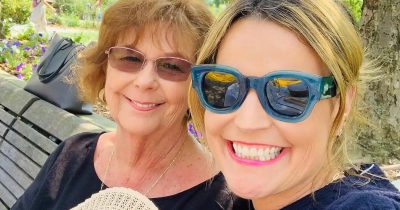
We still can’t cure Alzheimer’s disease, but catching it early greatly improves the chances of easing its impact.
45-year-old mom Samantha Walker was left “shocked and confused” after her diagnosis — and now she’s speaking out about the unexpected symptoms that tipped her off something was wrong.
Anyone who’s watched a loved one battle Alzheimer’s knows how devastating it can be. When someone in the family is diagnosed, it’s only natural for others to worry: Am I next? The truth is, about 8% of adults over 65 are living with some form of dementia. For those over 90, that number jumps to nearly 50%.
So it’s no surprise that when people think of Alzheimer’s, they picture an older adult battling memory loss and struggling with daily routines. But while aging plays a big role, it’s far from the full picture.
Samantha Walker, from Wofford Heights in California, knows this all too well.
She was diagnosed with early-onset Alzheimer’s in April 2025, challenging the common belief that this disease only affects the elderly.
Her story is one of many that show Alzheimer’s doesn’t always wait for old age.
The signs were already there
In an interview with Unilad, Samantha recalled feeling “shocked and confused” when she learned she had early-onset Alzheimer’s this past April.
But looking back, Sam realizes the signs were already there.
She described how her memory had started slipping in unsettling ways: “My roommate asked me if I had finished a chore he asked me to do, and I had no idea what he was talking about, even though we had discussed it just the day prior.”

The forgetfulness wasn’t limited to chores.
“I was able to watch a movie one day, and then watch it again the next day, still being surprised by the twists,” she said.
“I was losing words at an alarming rate, and struggling to keep up with conversations. I could be in the middle of a conversation and then forget what we were talking about, like my brain was a Etch A Sketch that someone just shook.”
Given her family’s history with Alzheimer’s, Sam couldn’t ignore the growing sense that something was seriously off. Early-onset Alzheimer’s is rare, but when it strikes before age 50, about half the cases are linked to a hereditary form of the disease.
This genetic variant often shows up much earlier than the more common, age-related version that typically affects people in their senior years.
“I tried to tell myself that my symptoms were normal, or just menopause,” she explained. “But my symptoms were more severe than that, and my intuition told me something was wrong.”
Considered assisted death
After a visit to her doctor and follow-up with a neurologist, scans and tests confirmed her fear. She had Alzheimer’s. The weight of the diagnosis took a toll —not just on Sam, but on her outlook for her family.
She feared that her 17-year-old son would lose her before he had the chance to fully grow up. She worried her partner would be left alone after the painful journey of becoming her caregiver. She felt that everyone she loved would be slowly taken from her, day by day, until she was nothing more than a shadow of her former self.
Sam even considered assisted death, hoping to “spare [her] family the pain.” But over time, she began to shift her focus from fear to finding joy in the small things.
“I have realized the power of joy, community, and family,” she said. “Instead of spending my days lamenting over my inevitable tragic death, I focused on moments of joy. Playing with my dog, watching my son grow into a man, catching up with an old friend over coffee.”
Time is limited
She knows her time is limited. On average, someone with Alzheimer’s lives about eight to ten years after diagnosis — some longer, some not. Still in the early stages of the disease, Sam is determined to make the most of her time.
But not everyone has been supportive. Sam has noticed that many people have written her off, with some disappearing from her life and others beginning to treat her like a child.
“Please don’t do that,” she urged. “We are still adults and we deserve to be treated as such. My disease is still in the very early stages, and I want to be an active part of my life while I still can.”

Now she’s raising money via GoFundMe to help with the costs of her care — like gas for travel to treatment, home modifications, and basic living expenses.
She’s also advocating for better support systems for people like her, who often fall through the cracks of traditional Alzheimer’s care.
It takes tremendous bravery for Samantha to share such a personal and difficult journey with the world. By opening up about her experience, she’s helping raise awareness and offering support to others facing similar challenges.
We truly admire her strength and resilience, and we wish her all the best as she navigates the road ahead. May she find hope, love, and support every step of the way.
READ MORE
- Single mom, 48, diagnosed with early Alzheimer’s reveals first symptom she noticed
- 41-year-old man’s first Alzheimer’s symptom came during sleep




